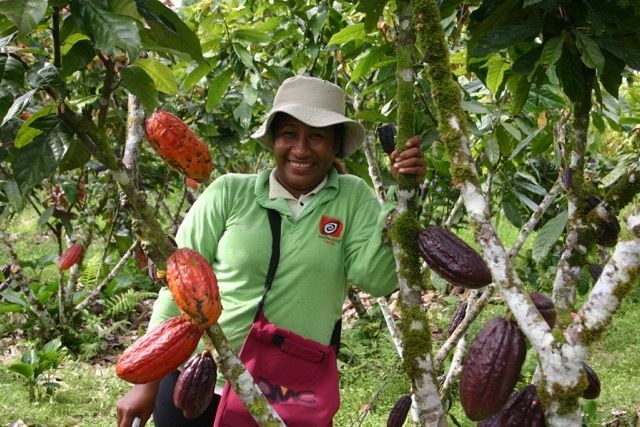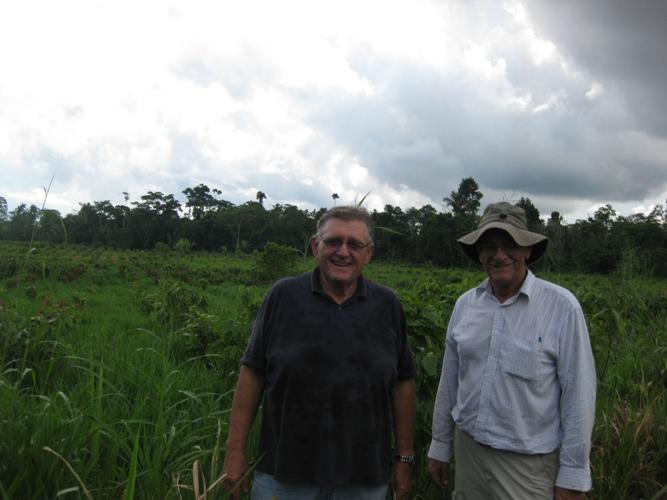Two University of Arizona graduates have launched their own brand of chocolate, hoping success will allow them to continue helping small farmers in the Amazon and set up Tucson as their national distribution hub.
Made from cacao they farm in Ecuador, the chocolate sold under the Sacha Gold label is the product of a conversation Richard Biocca and George Loquvam had in 1990.
“We were just joking around, talking over at his house in the Northwest, and said, ‘wouldn’t it be fun to farm together one day?’” Biocca said.
By that point, the men, who met at the university in the late ’60s, had already been friends for two decades. It would take almost as long for their project to come together.
“We had children to raise. I was working in produce in Mexico and Nicaragua,” Loquvan said. “I’ve spent a good deal of my adult life in Latin America. Sometimes in private business, sometimes on government projects.”
In 2003, Loquvam was in Ecuador when he found trees that were superior to anything he had ever seen, he said.
“We set up a baseline that we wanted at least 80 pods per tree and less than 10 percent disease. The first tree I saw had 800 pods and all the trees around it were riddled with disease,” Loquvam said.
He called Biocca and by 2007 they acquired the rights to use grafting material from those healthy trees to create their own.
“It’s the same process that nurseries use to put a good apple tree in your yard,” Biocca said. “There’s nothing modified. It’s all hand work.”
The first tree was planted in January 2008 and they now have about 35,000 trees in production.
About 15 months ago they began experimenting with making chocolate products in Ecuador, sharing them with family and friends to get their opinions.
They started making powder and nibs — roasted beans broken up into small pieces — then moved on to bars and chocolate-covered roasted beans.
Their cocoa has been classified as “fine” or “flavor,” one of two designations used in the industry to categorize cocoa beans, and the cocoa of choice when producing high-quality chocolate, according to the International Cocoa Organization.
For many years, the demand for fine cocoa had been on the wane, as concern over availability and improved manufacturing processes of chocolate allowed companies to improve taste with lower quality beans, according to a report by the cocoa industry trade group.
But an increase in worldwide demand for high-quality chocolate has led large companies to offer premium products as part of their sales line, and has led to the rise of artisan or boutique chocolate makers, the report said.
“It’s a crowded field but we think we have a product we can put on the shelf next to anybody,” Loquvam said, adding they are one of the few companies that offers a single-source “bean-to-bar” product.
The chocolate market is definitely large enough. In 2014, the world’s three top chocolate producers, led by U.S.-based Mars, Inc., accounted for more than $43 billion in sales.
While Sacha Gold has high hopes for its chocolate, it is starting small. Loquvam will continue to handle things in Ecuador and Biocca will sell at farmers markets around the state, as well as through the company’s website.
A slow rollout will not only allow consumers to get to know their product, they said, it will also allow them to get to know the business.
“We know the chocolate is good, but we’re farmers, not retailers,” Biocca said.
Helping small farmers
Although they may be new to business, Biocca and Loquvam said their philosophy of being good neighbors and helping their community is a vital part of the company.
As they were developing their farm, they also formed an outreach program for small farmers in the region.
“We started out, we wanted to have trees that made some money by selling cacao, but then along the line we realized we have something here that’s a gift,” Biocca said.
To date they’ve sold about 850,000 of their grafted trees to small farmers, both directly and through government programs. As a signee of the 2010 International Cocoa Agreement — part of the United Nations Conference on Trade and Development — Ecuador has agreed to help support sustainable development and to increase the benefits of cocoa farming to all stakeholders.
Making available a highly productive tree that’s disease-tolerant is only the first step, Biocca said. The company holds field schools to train growers on how to treat the trees and how to reach that production.
During the rainy season, disease can mean a 50 to 80 percent loss for farmers, Loquvam said.
“For that reason in Ecuador most farmers are really harvesters rather than producers,” he said. “They don’t make enough money from the crop to be able to spend time or money on that crop.”
While they can produce from 3.5 to 4 tons a hectare, most local farmers produce less than a half a ton, Loquvam said. He and Biocca want the Sacha Gold trees and their training to help change that.
“That’s where we hope to see these guys one day. Not only in terms of productivity but in terms of buyers talking to them and wanting their beans,” Loquvam said.
In fact, if things work out, those small farmers already have their first client, he said.
“We want to expand sales to a point that our 50 or 80 tons of beans are not sufficient and rather than expand ourselves, bring these small farmers with our trees in,” he said.
“There’s a whole range of opportunities that open up for a community when you have not just one or two farmers, but a thousand farm families doing better.”





